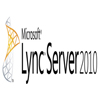
Candidates are IT or telecommunications professionals who have experience with complex deployments. They should know how to deploy and configure Lync Server 2010 for end users, endpoint devices, telephony, audio/video and web conferences, security, and high availability. The candidate should also know how to monitor and troubleshoot Lync Server 2010 using Microsoft tools. In addition, candidates should have experience with Windows Server Active Directory 2010 and network and telecommunication components that support the configuration of Lync Server 2010.
| Deploying, Configuring and Administering Microsoft Lync Server 2010 | 42 |
| Exam # | Duration | Language | Level | Type | Classroom | Code | Fees |
| 70-664 | 51 | English | Professional | Course | Classroom | Cs323 | 0 LE |
• In addition to their professional experience, students who attend this training should have an understanding of the following telecommunications concepts: The difference between TDM and VoIP – Gateways and PBX - Session Initiation Protocol (SIP) - Codecs - Dialing plans • Students should also understand the following general concepts: Networking fundamentals, including TCP/IP/UDP, DNS - Active Directory principles and management - Windows Server 2008 fundamentals - Public Key Infrastructure (PKI) - Exchange Messaging concepts - PowerShell basics - SQL Server concepts and operation
Microsoft Official Courseware (MOC)
This Package includes several labs to ensure you will gain the targeted skills and experience
When you pass Exam 70-664: TS: Microsoft Lync Server 2010, Configuring, you complete the requirements for the following certification(s): Microsoft Certified Technology Specialist (MCTS): Microsoft Lync Server 2010, Configuration Exam 70-664: TS: Microsoft Lync Server 2010, Configuring: counts as credit toward the following certification(s): Microsoft Certified IT Professional (MCITP): Microsoft Lync Server 2010 Administrator